Kandy City Tour
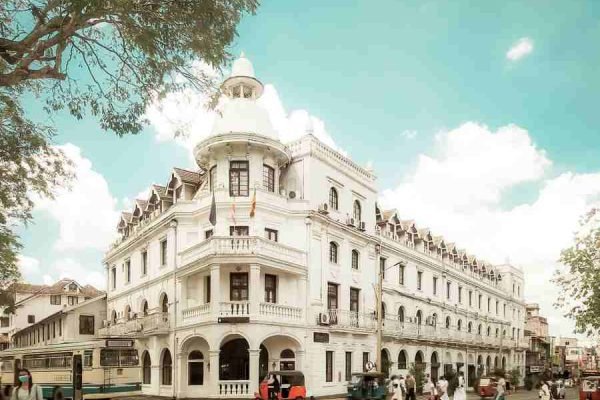
Location : Central province, Sri Lanka
Coordinates : N7 17 37 E80 38 25
Elevation : 500 m
Avg temperature : 20c to 30c
Humidity : 75% to 85%
Governing body : Kandy Municipal Council
Official name : Sacred city of Kandy
Type: Cultural
Criteria : (iv)(vi)
Designated : 1988
Reference no. : 450
UNESCO Region : Asia-Pacific
Are you looking for a destination that perfectly blends history, culture, and natural beauty? Look no further than Kandy City in Sri Lanka. Take a fascinating stroll through the Sacred City of Kandy, now a famous UNESCO World Heritage Site. Nestled amidst lush green hills and picturesque landscapes, Kandy City is a treasure trove of captivating attractions and experiences that will leave you in awe. This blog post will take you on a virtual tour of this enchanting city and highlight some of its must-visit places.
Kandy, also known as the cultural capital of Sri Lanka, is famous for the mesmerizing pageant, the ‘Esala Perehera, ‘ which is held annually in July/August to honor the sacred Tooth Relic.
Let’s take a tour around beautiful Kandy city.
- Royal Palace Complex in Kandy
Royal Palace complex contains many significant sections.
Temple of the Sacred Tooth Relic: One of the most significant religious sites in Sri Lanka, the Sacred Temple of the Tooth Relic, or Sri Dalada Maligawa, is a UNESCO World Heritage Site. This temple houses the sacred tooth relic of Buddha and is a place of pilgrimage for Buddhists from around the world. The temple complex is a spiritual haven and a stunning architectural masterpiece, adorned with intricate carvings and beautiful paintings.
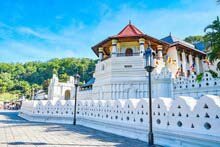
The Temple of the Sacred Tooth Relic, also known as Sri Dalada Maligawa, is the tower that enshrines the sacred Tooth of the Buddha. It is located within the royal palace complex in Kandy. The holy relic was brought to Sri Lanka in the 3rd century BC. It has been closely associated with the royalty of the island nation, with magnificent temples built to enshrine it in every kingdom. The golden canopy over the main shrine built in 1987, and the golden fence encircling the main shrine are other notable features of the temple.
Within the temple section, you will see the main chamber enshrining the sacred Tooth Relic, encased in seven gemstone-studded golden caskets shaped like stupas. The procession casket used during the Kandy Esala Perahera is also displayed in the same chamber, with a golden lotus flower studded with precious stones hanging from its ceiling. Its timber doors are carved and decorated in bronze and ivory. Octagon (Pattirippuwa), built during the rule of the last king of Kandy, Sri Wickrama Rajasinghe (1797 – 1814), was designed by Devendra Moolacarya, the architect, as part of the royal palace and used by the king to address his fellow citizens. Drumming Hall passing the entrance is a tunnel with beautiful murals that lead to the pillared hall where drummers perform the rituals during the ‘Tevava’ ritual conducted daily at regular times of the day in the morning, noon, and evening.
Royal Audience Hall: Finely carved masterpiece in timber; this is where the king met his ministers and carried out his daily administrative tasks. Many historical events have taken place at this location, and it was here that the British handed over the death sentence to the Sri Lankan national heroes Keppatipola Disave and Madugalle Disave.

The Kandyan treaty (document betrayed to the British) was signed on 2nd March 1815. A replica of the Royal Audience Hall of Kandy was constructed in granite in Colombo in 1948 to commemorate Sri Lanka’s Independence from the British.
Royal Palace:

The last king to reside in the Royal Palace was King Sri Wickrama Rajasinhe, who was overthrown by the British in 1815 with the aid of Kandyan chieftains.
Museum of ‘Raja’ the Maligawa Tusker:

On the left of the temple is a building that houses the taxidermied remains of the Maligawa Tusker – Raja, who carried the golden casket on the annual Perehera for 50 years. Raja passed away in 1988 and was declared a national treasure.
Queens’ Bathing Pavilion:
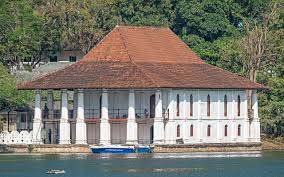
The ‘Ulpange’ or the Queen’s Bathing Pavilion is situated partly in the waters of the Kandy Lake and the other on land near the Temple of the Tooth Relic. This was part of the palace complex.
You have to pay the entry fee at the gate of the Royal complex.
- University of Kandy (Peradeniya University)

The University of Peradeniya has had a university tradition since the inception of the University of Ceylon in 1942. Located in one of the most picturesque settings, touching the lower slopes of the lush Hantana mountain range and by the banks of the Mahaweli River, it spans 700 hectares. It hosts nine faculties and four postgraduate institutes. On his first visit to the campus site in 1944 with the site plan of the architect Sir Patrick Abercrombie, Sir Ivor Jennings, the first vice chancellor, wrote, “No university in the world would have such a setting.” The grand university buildings are inspired by traditional Sri Lankan architecture and its elements and complement the beauty of this great institution.
- Kandy Lake
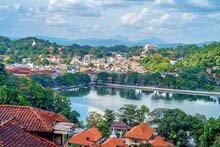
Kandy Lake is a beautiful artificial lake in the heart of the hilly city of Kandy, Sri Lanka. It was built in 1807 by King Sri Wickrama Rajasinghe next to the Temple of the Tooth. Over the years, it was reduced in size. It is a protected lake, with fishing banned.
There are a variety of different trees planted around the lake, including Nuga trees, palm trees, fruit trees, Sal trees, and Mara trees. Some of the trees are about 74 years old. The Municipal Council of Kandy now maintains the trees. Several bird species are found on the lake, including Indian cormorant, white egret crane, wood stork, and pelican.
A walking path was built around the lake for enjoying and relaxing with beautiful views. Kandy Lake is one of the main tourist points in the city.
- Gannoruwa Agro Farm

Gannoruwa is the best park in Sri Lanka for gathering more knowledge about agrobiology. Following interesting areas of Agro Farming can be seen and experienced at this venue,
Vegetable garden, Roots and Tuber crops, Plant genetic resources, Environmental friendly integrated farming, Banana garden, Bee-keeping, Leafy vegetable garden, Citrus garden, Demonstration of traditional tank (wawa) culture, Soil conservation and sacred tree, Insect zoo, Mushroom house, Jack Garden, Indigenous rice garden
- British Garrison Cemetery

“Dead men tell no tales.”
British Garrison Cemetery was established in 1817, just after the British captured Kandy, and was closed in 1873 due to a ban on burials within the municipal limits. However, a special provision was given to allow the burial of relatives of those already buried in the cemetery, with the last person to be buried there being Annie Fritz in 1951. The cemetery contains 195 graves of men, women and children. The most common causes of death were tropical diseases such as malaria and cholera.
- Royal Botanic Gardens Peradeniya
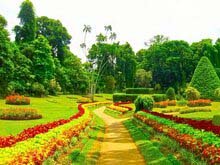
If you are a nature lover or simply looking for a peaceful escape from bustling city life, the Royal Botanical Garden in Kandy, Sri Lanka, is the perfect destination. Spread over 147 acres, this enchanting garden is a haven for flora and fauna enthusiasts, offering a delightful experience amidst the lush greenery and vibrant blooms.
The Royal Botanical Garden, also known as Peradeniya Botanic Gardens, dates back to the 14th century during the reign of King Vikrama Bahu III. Created as a pleasure garden for the royal family, it was later transformed into a botanical garden by the British in 1821. Today, it is a popular tourist attraction and a center for scientific research and conservation.
As you enter the Royal Botanical Garden, you will be greeted by a breathtaking display of exotic plants, trees, and flowers worldwide. The garden is divided into different sections, each with its unique charm and collection. Orchid House
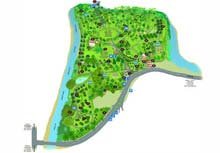
The Orchid House is a must-visit for all orchid enthusiasts. Here, you will find a stunning array of orchid species, each more beautiful than the last. The vibrant colors and delicate fragrance will leave you mesmerized. Palm Avenue strolls along the iconic Palm Avenue, a majestic pathway lined with towering palm trees on both sides. The symmetrical layout and the natural canopy created by the palms make it a picture-perfect spot for photography. Bamboo Grove escapes into a serene world as you enter the Bamboo Grove. The rustling of bamboo leaves and the soothing ambiance will transport you to tranquility. Take a moment to relax and enjoy the peaceful surroundings. Great Circle Drive, embark on a scenic drive along the Great Circle Drive, a circular path that takes you through the heart of the garden. Enjoy the panoramic views of the surrounding hills, the Mahaweli River, and the beautifully landscaped gardens. Flower Show: if you visit the Royal Botanical Garden during August or September, you are in for a treat. The annual flower show is a visual extravaganza, showcasing a stunning display of flowers, including rare and exotic varieties. Marvel at the creativity and skill of the local florists as they transform the garden into a paradise of colors. Conservation centers play a vital role in the conservation of endangered plant species. It houses a dedicated center for research and propagation, working to preserve rare and threatened plants. By visiting the garden, you are immersing yourself in the beauty of nature and contributing to the conservation efforts.
You have to pay the entry fee at the gate.
The gardens were used as a location in the 1957 film The Bridge on the River Kwai.
- Udawattakele Forest Reserve
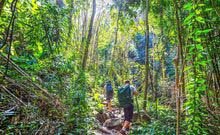
Udawattakele Forest Reserve, often called Udawatta Kele, is a historic forest reserve on a hill ridge in Kandy. It is 104 hectares (257 acres) large. During the days of the Kandyan kingdom, Udawattakele was known as “Uda Wasala Watta” in Sinhalese, meaning “the garden above the royal palace.” The sanctuary is famous for its extensive avifauna. The reserve also contains many plant species, especially lianas, shrubs, and small trees. There are several giant lianas. Many small and medium-sized mammals that inhabit Sri Lanka can be seen here. Several kinds of snakes and other reptiles might be seen. Udawattakele was designated as a forest reserve in 1856, and it became a sanctuary in 1938
Udawattakele is located on a hill ridge stretching between the Temple of the Tooth and the Uplands-Aruppola housing schemes.
It was used as a pleasure garden by the Kandyan kings. The forest was reserved for the Royal family, and the pond in the forest was used for bathing. The public was restricted from accessing the forest. The most popular is the shady lovers’ walk, which runs along the banks of the royal pond.
During rainy weather, leeches are lurking along paths that will attempt to suck blood from the feet and legs of unwary visitors. Mosquito repellent or herbal balms will protect against them.
You have to pay the entry fee at the gate.
- National Museum of Kandy
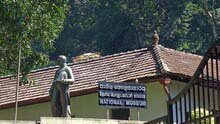
The Kandy National Museum, which opened in 1942, is located next to the sacred Temple of the Tooth and is housed in a section of the Royal Palace where the King’s concubines resided. This museum has over 5000 objects on display, and among the most impressive exhibits are King Sri Wickrama Rajasinghe II’s golden crown and a copy of the 1815 treaty known as the ‘Kandyan Convention’ by which on March 2, 1815, Ceylon ceded to the British ending 2,357 years of monarchy.
The building that houses the National Museum of Kandy was earlier known as the Palle Vahala and was home to the royals. The building’s architecture is pure Kandian, and it stores about 5000 artifacts from the Kandian era, including weapons, utensils, jewelry, etc. This is the best place to learn about the history of Kandy and the hidden gems and resources of Sri Lanka.
The building that houses the National Museum of Kandy was earlier known as the Palle Vahala and was home to the royals. The building’s architecture is pure Kandian, and it stores about 5000 artifacts from the Kandian era, including weapons, utensils, jewelry, etc. This is the best place to learn about the history of Kandy and the hidden gems and resources of Sri Lanka.
- Bogambara Prison
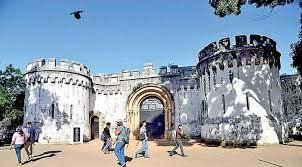
The prison was opened in 1876 and was used to house severe offenders and death row prisoners. The complex has gallows and was one of Sri Lanka’s only two prisons where the death penalty was implemented. The gallows were shifted from Hangman’s Hill to the prison in 1876.
In 1815, the British took possession of Sri Lanka following the signing of the Kandyan Convention. The British enacted the first Prison Ordinance, An Ordinance for the Better Regulation of Prisons Act No. 18, in 1844. It placed the supervision and control of all prisons under the jurisdiction of the Inspector General of Prisons and Police, Sir George William Robert Campbell. The first prison to be established under this Act was the Welikada Prison. In the early 1870s, the British Ceylon Government resolved to construct a new jail in Kandy under instruction from Frederick Richard Saunders, the Inspector General of Prisons and Police.
- Kandy View Point
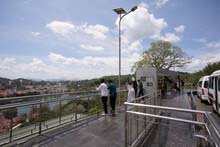
Kandy Viewpoint is a quick stop with a viewing platform from where you can enjoy a panoramic view of the entire Kandy city with its glamour blended with nature.
Perched on top of a mountain, this attraction offers mesmerizing views of the surrounding landscapes, making it a must-visit destination for nature lovers and adventure enthusiasts. Situated at approximately 1,500 meters above sea level, Kandy View Point provides an unforgettable experience for visitors seeking tranquility and natural beauty. Don’t forget to bring your camera and capture the stunning beauty of the surrounding mountains and the glistening lake bel
- Cultural Dancing Show
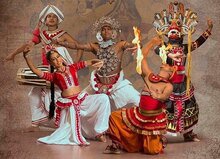
The Kandy cultural show captivates your ears and eyes with spectacular local culture and art displays starting in the evening. In this one-hour show, you will see drummers, fire dancers, and more in a cultural spectacle covering various aspects of Sri Lanka’s traditions. This cultural show depicts multiple forms of Kandyan dancing, which was once native to the area but has now spread to different island regions.
You get two options to enter the audience. You can pay an entry fee or obtain free tokens from the Gem shop if you visit. Please talk to your tour guide for the information.
We have written a separate article about the Cultural dancing show Kandy for those interested; the link follows immediately
https://pantheratravels.com/cultural-dancing-show-kandy/
- Kandy Bazaar
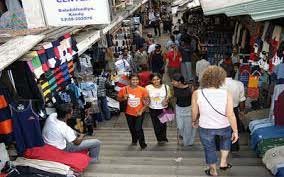
Kandy Bazar is full of unbranded, necessary fancy materials and clothing. You can see a lot of vendors at crossroads and on main streets. It is a highly crowded, noisy place, especially for locals. You’ll get all the good and evil there as it is full of locals. But many tourists also like to wander around. In the Bazar, you can find a variety of goods, but they are inexpensive, low quality, and no guarantee.
Note: If you visit Kandy Bazar, please pay extra attention to your belongings.
We have written a separate article about Shopping in Kandy for those interested; the link follows immediately.
https://pantheratravels.com/shopping-in-kandy/
Delightful Cuisine
Kandy is a paradise for food lovers, offering various culinary delights. The city’s restaurants cater to all tastes and preferences, from traditional Sri Lankan dishes to international cuisines.
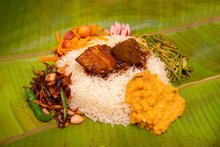
Don’t miss the chance to try local favorites such as hoppers, kottu roti, and string hoppers. For those with a sweet tooth, Kandy is famous for its fruits like Durian and many varieties.
As you can see, Kandy City is a destination that offers a perfect blend of history, culture, and natural beauty. Whether you’re a history buff, a nature lover, or simply seeking a peaceful escape, Kandy City has something to offer everyone. So, pack your bags and prepare to embark on an unforgettable journey to this enchanting city in Sri Lanka.
Tips for Kandy city tour
- Drink bottled water
- Ware appropriate clothes for visiting temples
- Ask permission before photographing someone
- Behave and act respectfully at all times
- Be polite! Sri Lankans will often approach you and ask your personal questions: “Where are you from? Where are you going? Are you married? How old are you?”. However, most people do not have bad intentions; they try to start a conversation or improve their English skills.
- Do it yourself, or if you need assistance, refer your tour guide
- Clothing made of cotton material is suitable for city visits
- Sunglasses and hats are recommended to protect yourself from the sun.
DON’T:
- Kissing in public
- Alcohol and cigarettes in public
- Alcohol consumption on the Full-Moon Poya and holidays is prohibited. Alcoholic beverages are not available in hotels or bars on these days. Adhere to this rule and stay sober
- Don’t get caught in the touts
- Giving candy or gifts to begging children
- Do not drink tap water

Hope you enjoyed the article. You can scroll down to our featured posts. Before you go to featured posts, Subscribe to read our new posts. We never use this email for promotions and offers. Our only purpose is for you to read our valuable content.
Featured Blog Posts

- Featured, Places

- Featured, Travel tips

- Featured, Places
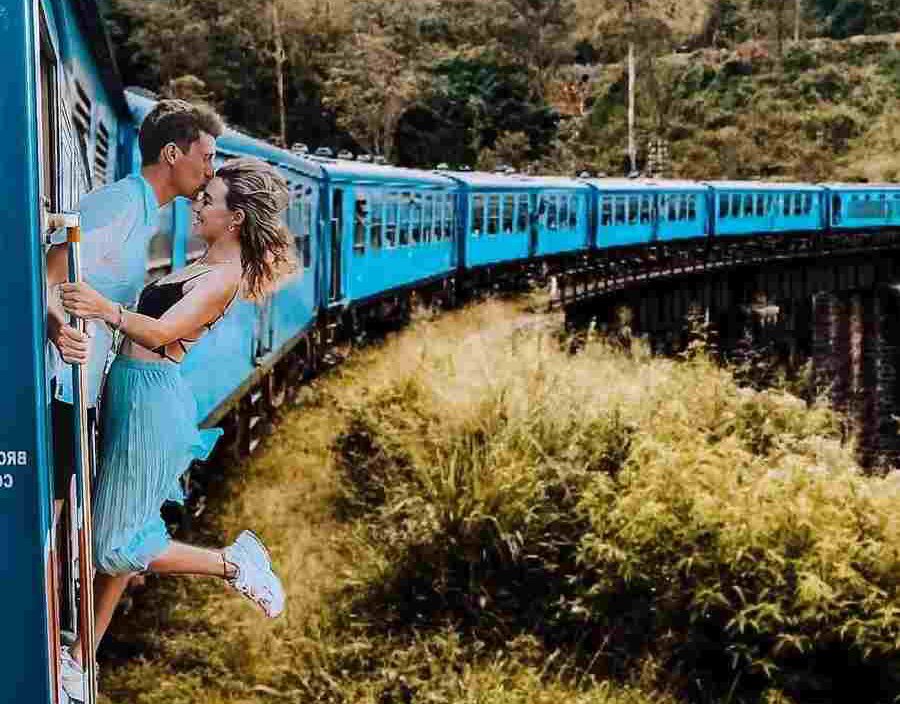
- Activities, Featured

- Activities, Featured, Wild life

